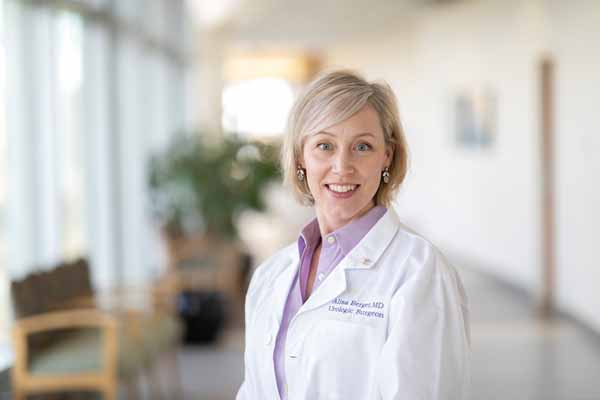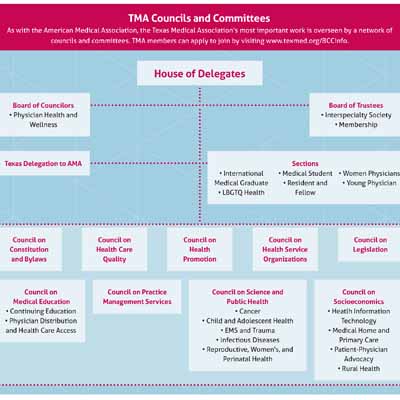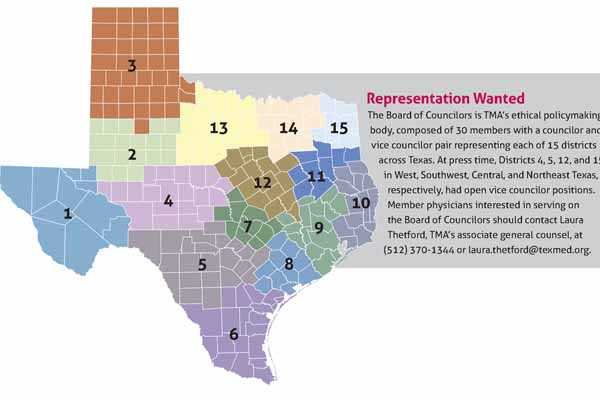
College Station urologist Alisa Berger, MD, spent years unaware of the Texas Medical Association Board of Councilors. She’s pretty sure she learned about the board while enrolled in TMA’s Leadership College as a young physician. But it didn’t stick until she was asked to help fill a councilor position as president of the Brazoria County Medical Society. She ended up assuming the role herself.
“After the first meeting, I was hooked,” she said.
Now, as the newly appointed chair, Dr. Berger is committed to shining a light on the board’s work and recruiting new members.
“We’re kind of behind the scenes,” she said. “But it’s definitely an honor to sit on this board.”
Established in 1903, the Board of Councilors is TMA’s ethical policymaking body. It is composed of 30 members, with a councilor and vice councilor pair representing each of 15 districts across Texas. Together, they render and update opinions on matters of medical ethics, from abortion and medical use of cannabis to physician-assisted suicide and restrictive covenants, among other responsibilities. (See “Board of Councilors 101,” right.)
TMA members are required to subscribe to the board’s ethics opinions, which represent a collective judgment and are intended to help physicians in their own decision-making.
Dallas anesthesiologist Shaina Drummond, MD, recently joined the Board of Councilors, which she believes plays a critical role in preserving the respect for and integrity of medicine as a profession.
“I have always been involved in organized medicine because it is important that we, as physicians, provide our own internal oversight, rather than allowing outside entities to shape policies that affect the patient-physician relationship,” she said.

Opinion section
The Board of Councilors forms and revises its ethics opinions in response to scientific advancements, cultural norms, and requests from member physicians and the House of Delegates. In their review, councilors draw on the American Medical Association’s Principles of Medical Ethics and current law.
Steven Petak, MD, a Houston endocrinologist and licensed attorney, is a past chair and current member of the board. Given his legal background, he has a strong interest in ethics. But he says each member brings his or her own expertise to the table.
“The main thing is that you’re committed to doing the very best job to care for your patients,” he said. “You don’t have to have any special skill set to get involved.”
Some of the board’s opinions reflect a changing consensus. For instance, the board updated its opinion on internet prescribing in May 2021, more than a year into the ongoing COVID-19 pandemic. Others reflect dissensus among TMA’s large and diverse membership, such as the opinion on abortion, which Dr. Berger says is nonspecific. Ensuring the opinions stay relevant and reflective of TMA’s membership is an ongoing process.
“It’s always changing,” she said. “We’re trying to keep up with the times.”
In addition to guiding Texas physicians in their practice, the board’s ethics opinions inform TMA policy. Clayton Stewart, TMA’s vice president of public affairs and chief lobbyist, says the House of Delegates’ 472 members often consult the opinions as they draft resolutions. Like the federal government, TMA’s three branches work in concert: the Board of Trustees is like the executive branch, the Board of Councilors like the judicial branch, and the House of Delegates like the legislative branch. (See “TMA Councils and Committees,” page 37.)
TMA members and county medical societies can also turn to the Board of Councilors when resolving disputes. “We’re supposed to be that liaison, both between the county medical societies and the TMA leadership but also for the individual TMA member,” Dr. Berger said.
Representation across Texas
Although the Board of Councilors accounts for geographic diversity, it relies on the interest of TMA member physicians to thrive. With 30 people representing more than 56,000 member physicians, any absences are felt. (See “Representation Wanted,” above.)
Dr. Berger suspects a lack of awareness and long terms – board members can serve up to six, three-year terms – are behind the vacancies, which is why she encourages members to nominate themselves or others to their respective county medical societies for these positions, especially if they feel the current board doesn’t represent their interests. When she joined the board in 2014 as a vice councilor from District 9, representing Southeast Texas, she was the only female member. Now there are six women on the board, whose insights are critical to forming complete opinions.
“[Representation is] vital for our success,” she said, adding that the board recently discussed TMA’s new focus on equity and diversity.
The Board of Councilors meets three times a year at TexMed and at TMA’s fall and winter conferences. In between, members typically break into smaller groups to consider new opinions or draft updates to existing ones, sharing feedback via email, over the phone, or on Zoom. The groups then report back to the full board for a vote. Sometimes, it takes multiple tries to reach a consensus.
Dr. Berger estimates the time commitment is similar to that of TMA’s other boards, councils, and committees. Physicians interested in joining the Board of Councilors may request to sit in on a regular meeting, although she says the robust discussions take place during closed executive sessions for board members only.
“The best way to learn about [the board], obviously, is to be on it,” Dr. Berger said.
Odessa allergist Vivek Rao, MD, joined the board seven years ago, inspired by his father, who served as a councilor from 1994 to 2006. He enthusiastically encourages his physician colleagues to consider joining him.
“I’ve learned a tremendous amount from participating, in terms of leadership style, how to consider these issues from an ethical standpoint, [and] how to keep all other considerations out of the picture,” he said. “At the end of the day, it’s a really satisfying experience.”

Tex Med. 2022;118(3):38-39
April 2022 Texas Medicine Contents
Texas Medicine Main Page